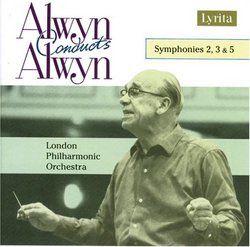| All Artists: William Alwyn, London Philharmonic Orchestra Title: Alwyn: Symphonies 2, 3 & 5 Members Wishing: 2 Total Copies: 0 Label: Lyrita Original Release Date: 1/1/2007 Re-Release Date: 1/9/2007 Genre: Classical Styles: Historical Periods, Modern, 20th, & 21st Century, Symphonies Number of Discs: 1 SwapaCD Credits: 1 UPC: 5020926022820 |
Search - William Alwyn, London Philharmonic Orchestra :: Alwyn: Symphonies 2, 3 & 5
 | William Alwyn, London Philharmonic Orchestra Alwyn: Symphonies 2, 3 & 5 Genre: Classical
"The performances are passionately authoritative and the vintage recording, from the 1970s, splendidly engineered." - GRAMOPHONE A leading member of the "lost generation" of British composers, William Alwyn wrote signi... more » |
Larger Image |
CD DetailsSynopsis
Album Description "The performances are passionately authoritative and the vintage recording, from the 1970s, splendidly engineered." - GRAMOPHONE A leading member of the "lost generation" of British composers, William Alwyn wrote significant orchestral and chamber music in the mid-twentieth century. This is one of two Lyrita recordings Alwyn made of his own orchestral music, and it is a most attractive introduction to his art. Similar CDs
|
CD ReviewsSuperlative composer-led performances, but not an entirely o Discophage | France | 11/26/2007 (4 out of 5 stars) "These composer-led symphonies, along with the companion disc containing symphonies 1 & 4 (Alwyn conducts Alwyn), are of course self-commending purchases for admirers of the music of William Alwyn. They were recorded in 1972 and 1975 (5th symphony) by Lyrita, a label specializing in British contemporary music, and this is their first CD reissue, dating from 1992. Lyrita then ceased its operations for a while but is now back in business, bringing the Alwyn discs back to ordinary availability - a fortunate circumstance, given the unreasonable prices sometimes demanded of the original CD release.
Besides the advantage of presenting the complete symphonies on two discs and in superlative performances, the recorded sound has held up magnificently. In the early 90s Richard Hickox made much-vaunted recordings of the complete symphonies for Chandos, but each symphony in that series were coupled with other orchestral or concertante pieces by the composer and thus entail(ed) the purchase of 5 CDs. Naxos has recently published the complete symphonies conducted by David Lloyd-Jones, on three Naxos-priced (e.g. budget) CDs, thanks to which you will get also the Sinfonietta for Strings and the Harp concerto "Lyra Angelica". Now, those who do not know the music of Alwyn and are curious to know what it is about are warned that, despite the fact that the 3rd and 5th symphonies were called by some, upon their respective first performances, the best British symphonies since Elgar, they may not find therein music of the originality of, say, Britten, Tippett or even Walton or Vaughan-Williams. Even someone not knowing about Alwyn's abundant activity in the realm of film music might be excused for finding that the two-movement 2nd symphony (1953) is film music turned to a symphony - the kind that Robert Flaherty might have used in his documentaries. It is with the thorny but still romantic 3rd symphony (1956) that the composer finds a more personal voice, although, to me ears, still heavily reminiscent of Vaughan Williams (his more dramatic 4th symphony, and hints of the Antartica and Sea), with echoes of Walton (the rhythmical tautness of the opening bars, evocative of the same in Walton's first) and Richard Strauss. It will come as no surprise that, with its four continuous sections (each bearing a quotation from Sir Thomas Browne's Hydriotaphia: Urn Burial), the compact and taut one-movement 5th symphony (1973) is the most original of the lot, with its alternation of dramatic gestures (try the opening ascending scale followed by biting, menacing brass and snare-drum then urgent woodwind filigree) and brooding lyricism. Still, the idiom is less individual than Britten's or Tippetts, these two towering beacons of 20th British music. Good, thorough booklet notes. " |

 Track Listings (6) - Disc #1
Track Listings (6) - Disc #1



